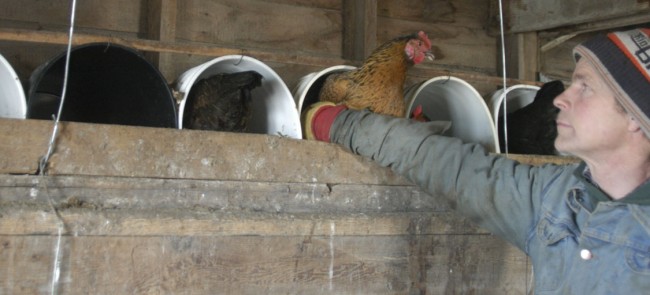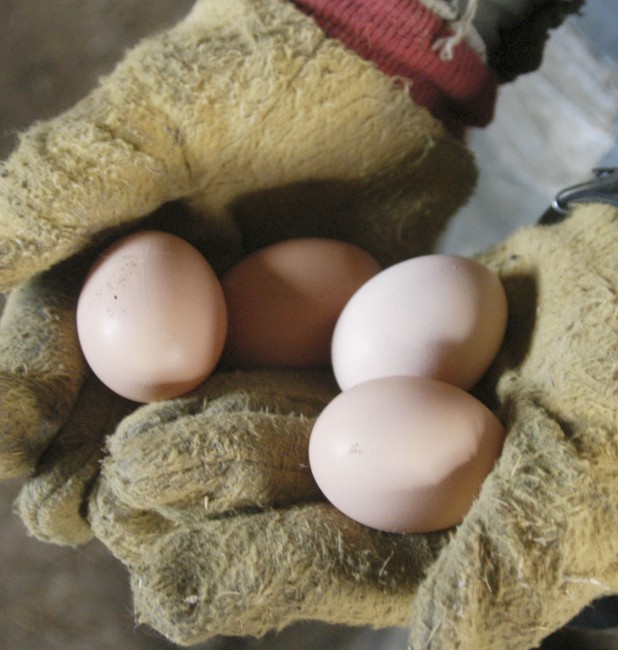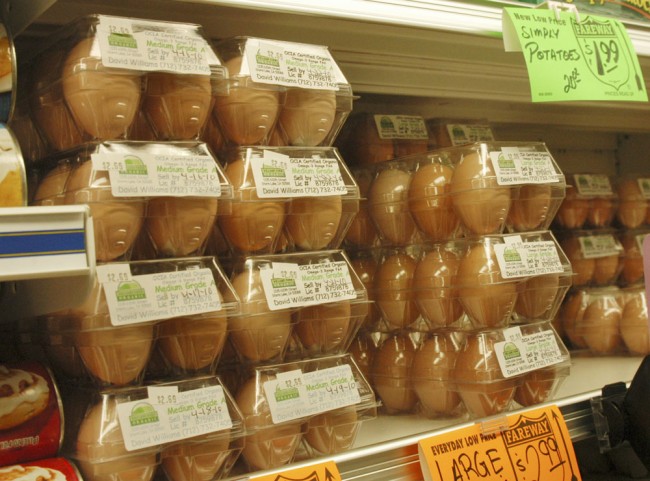Story by Dolores Cullen, Storm Lake Times, reprinted with permission.
Chickens on the Dave and Norma Williams farm scratch in the dirt and walk wherever they please. They wander into a shed, peck at organic feed, then hop into a nest and lay brown, organic eggs.
And Williams is happy to report that the 100 or so eggs laid each day by the Black Beauties are barely keeping up with demand.
A big break for Williams happened a year ago when his eggs made it onto the shelves of the Storm Lake Fareway store. The brown eggs, obvious in their clear, plastic cartons, cost around $3 – twice as much as eggs produced in big laying facilities.
“People like to buy them because they’re locally grown and organic on top of it,” said Fareway Store Director Bryan Baumhover. The eggs always sell out, especially last winter when cold weather was slowing down the layers.
Other Storm Lake grocery stores carry organic and cage-free eggs which are produced elsewhere.
For two years, Williams has been selling his eggs to One Stop Meat Shop in Sioux City. Last Friday he had 43 dozen delivered to the business. He’s had inquiries from as far away as Minneapolis. One place tried to make arrangements to pick up three cases a week. It never materialized, but it assured Williams that consumers want organic eggs.
“I’ve gotten calls from people in Sioux City,” said Williams. (His phone number is on each carton.) They tell him they like the taste of the eggs and that regular eggs have no taste at all. They like the bright yellow yolks that don’t flatten into the frying pan like the regular eggs do.
The term “range fed”
Callers often ask what range fed means. “I tell them it means that I open the door every morning and if they want to come out, they can.” To call his chickens range fed, he’s required to allow a certain number of square feet per chicken. They wander all over the driveway and up to the north side of the house, but seldom do they get out on the road. They eat bugs. (Dave said they never have crickets in the house.) They eat worms and he’s seen one eat a mouse.
“Chickens are dirty animals,” Williams said, comparing them to a white kitten who wanders among the flock.
“But animals are meant to be free,” says Williams. He doesn’t like the idea that most laying hens spend their entire lives crammed into small cages. In confinements, young chickens have to be debeaked to keep from cannibalizing eachother. For that reason, many of his customers pay the higher price for eggs from range fed hens.
And each evening at twilight, the chickens know enough to go back into the barn and shed outfitted for them.
“You have to be committed”
Williams’ farm, located a mile northeast of Storm Lake’s gateway lighthouse, is certified organic, and the green and white “USDA Organic” sticker on each egg carton represents years of hard work and persistence without much profit.
It takes three years of chemical-free farming to earn the certification. Williams puts up signs to keep the county from spraying his ditches. He has to see that spray planes keep their distance. Transitional ground at least 25 feet wide must be maintained between his land and his neighbors’. Last year he planted trees on his 30-foot buffer strip, but they all died. He’ll replant them again this year.
Keeping the weeds under control is the big challenge. Weeds have to be managed mechanically. He’s not afraid to try new things. This year he’s raising a few goats to help keep the weeds down. He uses chicken manure for fertilizer.
“You have to be committed to it,” says Williams of organic farming. “There’s other people that tried it. They see the weeds come up and spray ‘em and quit.”
He knows of at least two other successful organic farmers in the area though. One whose corn and soybean yields are as good or better than farmers who use chemicals.
A premium product
Williams believes that chemicals feed the plant, but rob the soil. “Organic feeds the soil, which in turns feeds the plant, which feeds humans and animals.”
Last year he raised corn, flax, field peas, oats and spring wheat. These grains are mixed with organic pre-mix and fed to his chickens. The flax makes the eggs lower in cholesterol, he says.
The field peas and flax didn’t grow too well, but in the future, he will buy these grains elsewhere and focus on his crops that are successful.
A system of paperwork goes with the organic label so he can produce a paper trail for anyone who is skeptical that he’s organic. An inspector comes to his farm yearly to check that he is following the specified requirements. Even with oversight, much is left to the honor system, which Williams says he takes seriously.
Confident that the market for organic eggs exists and that he’s virtually the only producer in the area, Williams plans to increase his flock this summer. Currently he has about 200 chickens. He may add another hundred.
He’s required to buy the chicks at two days old and start them on their organic regimen. He’s glad the winter is over. The cold weather reduced the daily egg output to only 40. The deep snow made it more than a chore to go out and collect the eggs, which he tries to do four times a day.
Old five-gallon buckets on their sides make do for nests. He cares for the chickens much like his grandmother did a generation ago. Williams washes and grades the eggs in his kitchen. They are refrigerated in his basement. It’s nothing fancy.
Williams also raises organic grass fed cattle. Customers pay $5 for his hamburger at the Sioux City meat shop. Others come to the farm and purchase halves or quarters, as they do eggs –straight from Williams.
“It’s a premium product,” he says, considering the fruits of his labor. “I’m doing people a service and that is a joy in itself.”



Williams organic eggs are marketed at Fareway, Storm Lake